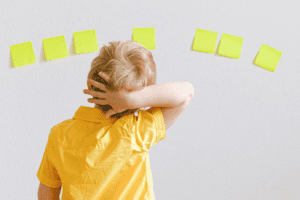Empowering Student Success:
Executive Functioning and Personalized Learning Strategies
We offer several options to customize your child’s executive functioning learning plan.
Option 1:
Executive Function with Academic Support
If you are primarily looking for schoolwork support with an overview of executive functioning strategies, this is the best option!Program Details
- The MindPrint assessment will be administered during the first session.
- The Student Learner Profile will be reviewed.
- After this initial session, students are supported with planning, organizing, and finding successful approaches to tests and assignments.
- The majority of each session will be spent on classwork support with Executive Function instruction as time permits.
Option 2:
Executive Function
BOOST YourSELF Course
If you are primarily looking for your child to understand what executive functioning is and learn individualized strategies, this is the best option! Program Details
- The MindPrint assessment will be administered during the second session.
- The Student Learner Profile will be thoroughly explored in each lesson.
- After this initial session, students work through the BOOST YourSELF Curriculum. For a more specific breakdown, see the BOOST YourSELF Course Outline below.
- The majority of each session will be Executive Function instruction with classwork support if time permits.









